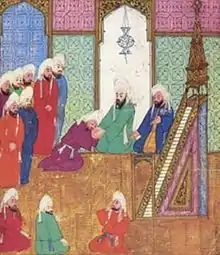Bay'ah
Bayʿah (Arabic: بَيْعَة, "Pledge of allegiance"), in Islamic terminology, is an oath of allegiance to a leader. It is known to have been practiced by the Islamic prophet Muhammad. Bayʿah is sometimes taken under a written pact given on behalf of the subjects by leading members of the tribe with the understanding that as long as the leader abides by certain requirements towards his people, they are to maintain their allegiance to him. Bayʿah is still practiced in countries such as Saudi Arabia and Sudan.[1] In Morocco, bayʿah is one of the foundations of the monarchy.
| Part of a series on |
| Islamic jurisprudence (fiqh) |
|---|
 |
| Islamic studies |
Etymology
Bay'ah derives from the Semitic triconsonontal root B-Y-’, related to selling, and shows the contractual nature of the bond between caliph and people.[2] Bay'ah originally referred to the striking together of hands between buyer and seller to mark an agreement.[3][4]
In Islamic history
The tradition of bayʿah can be traced back to the era of Muhammad. From the beginning bayʿah was taken by Muhammad as an oath of allegiance. Anybody who wanted to join the Islamic community did so by reciting the basic statement of the faith expressing his faith in the oneness of God and the prophethood of Muhammad. However, this differed from the proclamation of faith necessary to simply become a Muslim. In addition to this the prophet formally took bayʿah from the people and tribes. Through this formal act they entered the Islamic community and showed their willingness to follow and obey Muhammad. The wordings of the oath differ in different traditions but it contains the shahada and prayers of repentance.
It is reported that at the occasion of annual gatherings outside Mecca, Muhammad met people from Yathrib, later to be renamed Medina, who accepted his call towards Islam. Muhammad then took bayʿah from them.[5]
In the Qur'an

After the Pledge of the Tree, which led to the Treaty of Hudaybiyyah, the following was revealed in the Qur'an commemorating and appreciating the pledge and those who made it:
Certainly Allah was well pleased with the believers when they swore allegiance to you under the tree, and He knew what was in their hearts, so He sent down tranquillity on them and rewarded them with a near victory,
History
The bay'ah of Rizwan, a collective initiation of thousands of Muslims at the hand of Muhammad, is mentioned in the Qur'an. The tradition was continued by the caliphs.
In subsequent ages, it was associated with Sufi orders, and spiritual masters would initiate their followers. The practice still exists in Sufi orders around the world.
Content of the bay'ah
The Bayah usually consists of a relatively standardised formulation such as the following:
I give my allegiance to .... to hear and obey in times of difficulty and comfort, in hardship and ease, and to endure being discriminated against, and not to dispute about rule with those in power, except in case of evident infidelity regarding that which there is a proof from Allah,”
See also
References
- Lesch, Ann M. (March 22, 2001). "THE IMPASSE IN THE CIVIL WAR". Arab Studies Quarterly. Archived from the original on 9 November 2007. Retrieved 14 December 2019 – via Encyclopedia.com.
- "Hizb ut Tahrir". www.hizb-ut-tahrir.org.
- Shīrāzī, ʻAbd al-Karīm Bīʹāzār (March 9, 1977). "The Covenant in the Qurʼân: The Key to Unity of the Verses Contained in Qurʼanic Surahs". Office for Diffusion of Islamic Culture – via Google Books.
- Bravmann, Meïr Max (March 9, 2009). The Spiritual Background of Early Islam: Studies in Ancient Arab Concepts. BRILL. ISBN 978-9004172005 – via Google Books.
- Desker, Barry (2015). Perspectives on the Security of Singapore: The First 50 Years. p. 243.
